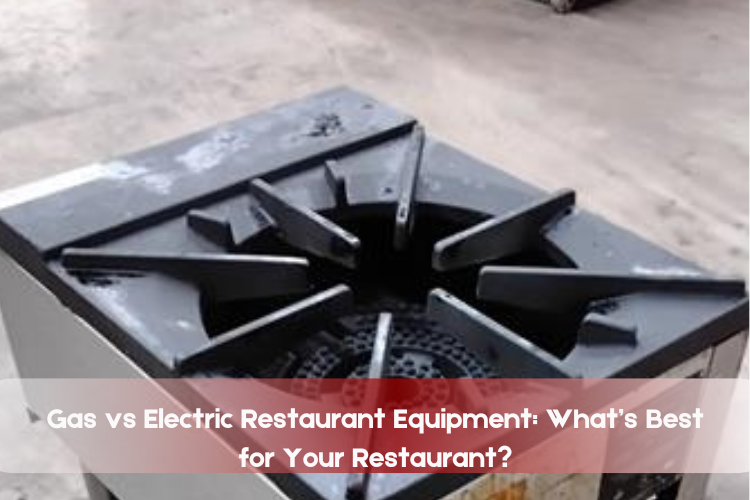Want to sell or consign your equipment?
Call us and learn how!
Se Habla Español
Dallas:
972-642-0513
Arlington:
682-252-4020
Irving:
972-579-4612

When outfitting your kitchen with commercial restaurant equipment, one of the most important decisions you will face is choosing between gas and electric appliances. Whether you’re opening a new restaurant or upgrading your kitchen, this decision will impact your restaurant’s efficiency, energy consumption, and overall operational costs. For restaurant owners in cities like Fort Worth or Dallas, selecting the right restaurant equipment is crucial for optimizing operations and minimizing long-term expenses. Let’s explore the pros and cons of gas vs. electric restaurant equipment to help you make the best choice for your business.
Why Choosing the Right Restaurant Equipment Matters
Selecting the right commercial restaurant equipment is vital because it influences the kitchen’s functionality, food quality, and energy consumption. It can also have a significant impact on operational efficiency and overall costs. Whether you’re in need of a stove, oven, fryer, or griddle, knowing which type of appliance fits best for your restaurant in Fort Worth or Dallas can make a huge difference. There are specific advantages and considerations when choosing between gas and electric, and both options have their place in different types of restaurant kitchens.
Gas Restaurant Equipment: A Time-Tested Choice
Gas-powered restaurant equipment has been around for a long time and is commonly used in commercial kitchens. It’s often preferred by chefs who need precise temperature control and quick adjustments while cooking.
Pros of Gas Restaurant Equipment
-
Instant Heat and Precision Control One of the key advantages of gas appliances is their ability to provide immediate heat. Unlike electric equipment, which requires time to heat up, gas equipment can be adjusted instantly. For fast-paced restaurants, this quick control is crucial. For example, if you need to increase the heat on your griddle or range, you can do it immediately with the turn of a knob.
-
Higher Cooking Power Gas restaurant equipment tends to deliver more cooking power compared to electric units. If your restaurant specializes in high-output cooking like grilling, deep frying, or sautéing, gas may be the better option. It provides more BTUs (British Thermal Units), which can result in faster cooking times and higher-quality results.
-
Cost-Effective Energy Use In many areas, natural gas is more affordable than electricity, making gas-powered restaurant equipment a more cost-effective choice in the long run. For restaurants in Fort Worth or Dallas, where natural gas prices are generally lower than electricity, investing in gas equipment could save you money each month on your utility bill.
-
Reliability During Power Outages Gas appliances can function even if there is a power outage, making them ideal for areas prone to electrical disruptions. For restaurants in Dallas or Fort Worth, where thunderstorms and power outages may occur, this added reliability is beneficial for uninterrupted service.
Cons of Gas Restaurant Equipment
-
Installation and Maintenance Costs Gas appliances often require a gas line installation and more complicated maintenance than their electric counterparts. This can lead to higher upfront costs, both in terms of installation and maintenance. If you're operating a restaurant in Dallas or Fort Worth, ensure you have a qualified technician to handle the installation and upkeep of your gas equipment.
-
Heat Emission and Ventilation Needs Gas appliances generate significant heat, which can make your kitchen uncomfortable and increase air conditioning costs. Adequate ventilation is a must when using gas-powered equipment, so you’ll need to invest in high-quality exhaust hoods and ventilation systems. This is something to consider when purchasing commercial restaurant equipment for your space.
Electric Restaurant Equipment: Efficiency and Convenience
Electric restaurant equipment is often seen as more modern and user-friendly. It’s popular for smaller kitchens or when you need appliances that are easy to operate and maintain.
Pros of Electric Restaurant Equipment
-
Energy Efficiency Electric restaurant equipment tends to be more energy-efficient than gas-powered units. Electricity heats elements evenly and maintains heat more effectively, which can result in lower energy consumption. For restaurants in Fort Worth or Dallas looking to reduce their carbon footprint and energy bills, electric equipment may be the best choice.
-
Easy to Use and Clean Electric appliances are often easier to use and maintain than gas models. There’s no need for a gas line installation, and they don’t require complicated maintenance. For small to medium-sized restaurants, electric restaurant equipment could be the more convenient and cost-effective choice. Additionally, electric stoves, ovens, and fryers are typically easier to clean because they don’t produce as much soot or grease buildup.
-
Less Heat and Ventilation Requirements Electric restaurant equipment typically produces less heat compared to gas-powered appliances. This means you’ll have fewer ventilation and air conditioning issues, making electric equipment a better choice for smaller kitchens or places with limited ventilation.
-
Precise Temperature Control Many electric restaurant appliances come with digital controls that offer precise temperature management. This can be particularly beneficial for bakeries or pastry shops that need consistent and exact temperatures for cooking or baking.
Cons of Electric Restaurant Equipment
-
Slower Heating Times One of the drawbacks of electric restaurant equipment is its slower heating time. Unlike gas equipment, which can reach cooking temperature almost immediately, electric units may take longer to heat up. In a fast-paced kitchen, this can be a significant disadvantage.
-
Higher Operating Costs While electric equipment is more energy-efficient in some cases, the cost of electricity in certain regions can make electric appliances more expensive to operate. For restaurants in Dallas or Fort Worth, where electricity costs can fluctuate, electric equipment might result in higher energy bills over time.
-
Limited Cooking Power Electric appliances generally offer less cooking power compared to their gas counterparts. For restaurants that require high-output cooking (such as deep frying or grilling), electric equipment may not be sufficient to meet the demand. Gas-powered units are often preferred in these situations because they can provide the power necessary for high-heat cooking.
Choosing Between Gas and Electric Restaurant Equipment
Ultimately, the decision between gas and electric restaurant equipment comes down to your specific restaurant needs, budget, and the type of cuisine you serve. If you run a high-output kitchen that requires immediate heat and precise temperature control, gas equipment may be the best option. On the other hand, if you have a smaller kitchen or are looking for a more energy-efficient, low-maintenance option, electric restaurant equipment could be a better fit.
For restaurant owners in Dallas or Fort Worth, the type of restaurant you operate will also play a key role in your decision. Fine dining establishments or restaurants that require precise control and fast cooking times may lean towards gas equipment. However, smaller eateries, cafes, or dessert shops might find that electric equipment suits their needs better.
Where to Find Quality Restaurant Equipment in Dallas and Fort Worth
When you’re in the market for commercial restaurant equipment, it’s essential to work with a reliable supplier who understands your needs and offers quality products. Whether you're looking for gas or electric equipment, companies like Texas Restaurant Supply in Dallas and Fort Worth are a trusted source for all your kitchen needs. They provide a wide range of equipment, from ranges and fryers to ovens and refrigeration units, all tailored to meet the demands of your restaurant. No matter which type of restaurant equipment you choose, finding the right supplier is key to ensuring your kitchen runs smoothly and efficiently.
Conclusion
Both gas and electric restaurant equipment come with their own set of benefits and drawbacks. It’s important to assess your restaurant’s specific needs, energy considerations, and the type of cuisine you serve when making a decision. Whether you’re in need of gas or electric options, Texas Restaurant Supply has the expertise and inventory to help you select the best restaurant equipment for your restaurant in Dallas or Fort Worth.
- Lista de Equipos Esenciales para la Cocina de Restaurante
- The Essential Restaurant Kitchen Equipment List
- Texas Restaurant Supply
- Texas Restaurant Supply
- Cómo Mantener Bien Su Refrigerador: Una Guía para Propietarios de Restaurantes
- How to Keep Your Refrigerator Well Maintained: A Guide for Restaurant Owners
- Razones por las que tu Bar Debe Tener un Lavavajillas Bajo Mostrador
- Reasons Your Bar Should Have an Under Counter Dishwasher
- ¿Qué Equipo Necesitaría para Iniciar un Restaurante de Hamburguesas?
- What Equipment Would I Need to Start a Burger Restaurant?
- What Equipment Would I Need to Start a Burger Restaurant?
- What Equipment Would I Need to Start a Burger Restaurant?






